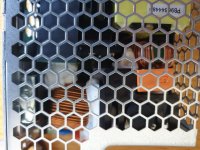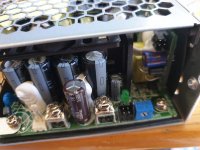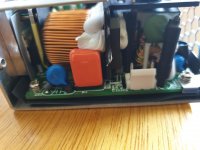Goop: accepted for mainstream use
I admit, I had my doubts. But today, I received a couple of MeanWell RPS-500-48-C switching power supplies. 500 watts continous from something very small and light weight.
They are fine engineers, those working for MeanWell. I have never seen a MeanWell power supply fail, just to mention one thing. And they have accepted Goop, some of the best SMPS-engineers that have ever walked the Earth.



Now, I don't know if it is quantum goop, but at least it is white and not black. So best for audio. And as can be easily seen, the Goop is strategically placed around coils with ferrites and electrolytics, as we all know those kinds of components have doubtful qualities when it comes to audio.
I admit, I had my doubts. But today, I received a couple of MeanWell RPS-500-48-C switching power supplies. 500 watts continous from something very small and light weight.
They are fine engineers, those working for MeanWell. I have never seen a MeanWell power supply fail, just to mention one thing. And they have accepted Goop, some of the best SMPS-engineers that have ever walked the Earth.



Now, I don't know if it is quantum goop, but at least it is white and not black. So best for audio. And as can be easily seen, the Goop is strategically placed around coils with ferrites and electrolytics, as we all know those kinds of components have doubtful qualities when it comes to audio.
Last edited:
As the spin doctor nowadays insists that the FUD shouter is only jestering, I'll let it go.....
Ok, but still no data to support that claim of a short magnetic wire in a relay that added 10dB of distortions to a power audio amplifier. Deflections don't count as data.
😀😀😀Now, I don't know if it is quantum goop, but at least it is white and not black. So best for audio. And as can be easily seen, the Goop is strategically placed around coils with ferrites and electrolytics, as we all know those kinds of components have doubtful qualities when it comes to audio.
If I'm on a forum with such problem, I would leave.It is the nature of forums to have such problems, and it is a problem here, IMHO.
Another one of your psychology term post. Last time you did that, the post was deleted by mod/s. https://www.diyaudio.com/forums/the-lounge/204456-hi-fi-127.html#post4968076Psychopathy - Wikipedia
Psychopathy in the workplace - Wikipedia
Don't know why he would do that...
...and you say you didn't bat an eyelash?
You know I believe you.
Wet slug tantalum caps are very expensive already and do not tolerate reverse voltage on them. None at all.
If it was a double blind test in a good circuit and the caps were not being used as a filter then this might qualify for my 'real capacitor issues'. It might not be easy to organise double blind cap swapping in a particular unit, and swapping between two nominally identical units carries with it other issues.mountainman bob said:What about the people that can hear the differences apples for apples (caps of same values and materials) in a well designed circuit?
If you want proof then you have to do mathematics, not engineering. We are happy to settle for evidence, the amount of evidence needed depending on how unlikely the claim is. 'My friend swapped the caps over and then it sounded better' is not evidence. 'We did not know which cap was which but I could usually hear slightly better sound from unit X' may be just the beginnings of evidence.So basically, if the EE has no proof it therefore does not exist?
I am pretty sure swapping 20+ year old electrolytic capacitors for new ones in gear will make a difference. 😉
At the moment some of my guys are restoring a 40 year old mixing console. An Allen & Heath SynCon B that new back then was around $17,000. I expect to make measurements on each stage of the repairs/upgrades. In particular each gain stage uses electrolytic coupling capacitors that should not have any DC bias.
So basically it is swap out the vintage NE5532 opamps for a newer design. Change out all the capacitors and the signal path resistors. Of course if the changes in a few modules do not show improvements then that change probably won't be done in the rest of them.
I feel the circuit design is consistent with current practice. Just there may be better component choices available.
It is also undergoing cosmetic changes, as the guys don't like the 70's earth tone color scheme.
At the moment some of my guys are restoring a 40 year old mixing console. An Allen & Heath SynCon B that new back then was around $17,000. I expect to make measurements on each stage of the repairs/upgrades. In particular each gain stage uses electrolytic coupling capacitors that should not have any DC bias.
So basically it is swap out the vintage NE5532 opamps for a newer design. Change out all the capacitors and the signal path resistors. Of course if the changes in a few modules do not show improvements then that change probably won't be done in the rest of them.
I feel the circuit design is consistent with current practice. Just there may be better component choices available.
It is also undergoing cosmetic changes, as the guys don't like the 70's earth tone color scheme.
Another form of proof is when many people describe hearing a difference in exactly the same manner. I love using medical as an example because it uses people feedback for accuracy.
If most people say this white powder called aspirin makes their headache go away, it is true then. No other "tests" need to be done to know if it makes headaches go away. Does not matter if you know why it does so or not. Does not matter that you cant show a test measurement data to "prove" it does what people describe. Nor matter if you have a test which shows no change occurred in the person. The people's experience and perception of the aspirin effect is true and real.
THx-RNMarsh
According to this nonsesnse most people say there is no difference between 64k mp3 and CD so it is true. Wow lets do all scientific research by vote, thats the way to get to the truth.
It would still be useful to know whether any white powder also works, or any white powder which the recipient believes to be aspirin, ar any powder of any colour. Hence the need for blind tests.
And, indeed that in curing your headache it doesn't then kill you...
My understanding of electrolytics is that they need a DC bias.I am pretty sure swapping 20+ year old electrolytic capacitors for new ones in gear will make a difference. 😉
... In particular each gain stage uses electrolytic coupling capacitors that should not have any DC bias. .
Do you really think that even if you can measure a difference, that anyone will hear it? The NE5532 is probably the most used opamp in the production of audio entertainment recordings. It's long in the tooth now, and not suitable for new designs but it's still a superb opamp. Probably 80% of your recordings' audio has passed through several of these.So basically it is swap out the vintage NE5532 opamps for a newer design. ...tone color scheme.
Last edited:
If we really want to talk about science, let's PLEASE use the word hypothesis as a "proposed explanation" instead of theory. The word theory in ordinary English usage does indeed mean that, but that's NOT what theory means in science. In science, theory means a well-established explanation for some phenomenon.About the rings of Saturnus there were different theories. Theories are part of the scientific process.
The next step in the scientific process is to validate those theories, for example in the case of Saturnys by going there with a space craft. Unless verified (or falsified), theories are worth nothing.
Hence my utter disappointment when members here only throw theories around, have an excellent opportunity to verify, but don't. Like with the gooped Benchmark.
Scientific theory - Wikipedia
Other than your word usage, I agree with your comments.
Likewise, thanks to DF96's comments on "proof." A scientific study can confirm a hypothesis or dispute it (it's tempting to say disprove here, but that might be confusing, and it's also too strong a word as a single scientific study is far from perfect). To get a really good idea of whether a hypothesis is likely true requires several independent scientific studies.
If there's any "proof" in science, it might involve measuring a beverage's alcohol content.
Yes electrolytics do work better with a bias voltage.My understanding of electrolytics is that they need a DC bias.
Do you really think that even if you can measure a difference, that anyone will hear it? The NE5532 is probably the most used opamp in the production of audio entertainment recordings. It's long in the tooth now, and not suitable for new designs but it's still a superb opamp. Probably 80% of your recordings' audio has passed through several of these.
The more modern opamps will have lower distortion and noise. If it were just one in series it would be a small difference. But with several and used with gain I expect a perceptable improvement.
No, that would be TL072.The NE5532 is probably the most used opamp in the production of audio entertainment recordings.
Polarised electrolytics can be reformed, how about bipolars? I ask because I have built Doug Self's preamp and it uses a lot of bipolars but I'm not using it at the moment, will the capacitors suffer by effectively being left on the shelf?
Probably not a problem since leakage isn't an issue due to them not being polarised in the first place?
Probably not a problem since leakage isn't an issue due to them not being polarised in the first place?
Last edited:
The more modern opamps will have lower distortion and noise. If it were just one in series it would be a small difference. But with several and used with gain I expect a perceptable improvement.
You do need to consider the growth of noise and distortion in a gain structure, i.e. things like Friis' formula. It is fairly easy to set things up so the noise floor is dominated by the first amplifier in the chain with no benefit at all in improving devices down the chain. I have not seen the same done for distortions but simply rss'ing everything together is not the right answer.
Another form of proof is when many people describe hearing a difference in exactly the same manner. I love using medical as an example because it uses people feedback for accuracy.
If most people say this white powder called aspirin makes their headache go away, it is true then. No other "tests" need to be done to know if it makes headaches go away. Does not matter if you know why it does so or not. Does not matter that you cant show a test measurement data to "prove" it does what people describe. Nor matter if you have a test which shows no change occurred in the person. The people's experience and perception of the aspirin effect is true and real.
THx-RNMarsh
And amplifying your statement: in order to make a better analgesic, tests are run with varying components determined by chemical assay to determine which have the most beneficial effect. Further, any production facility making this high-quality analgesic must have instrumentation to ensure accurate production.
Howie
If most people say this white powder called aspirin makes their headache go away, it is true then. No other "tests" need to be done to know if it makes headaches go away. Does not matter if you know why it does so or not. Does not matter that you cant show a test measurement data to "prove" it does what people describe.
And you worked in hard science, no wonder folks think the Apollo landings were faked.
And you worked in hard science, no wonder folks think the Apollo landings were faked.
Yes, and neglects to mention that it is very important that medication is proven to be more effective than placebo.
No, that would be TL072.
Not in anything the least professional. I'm talking production/broadcast, not "stereos".
- Status
- Not open for further replies.
- Home
- Member Areas
- The Lounge
- John Curl's Blowtorch preamplifier part III